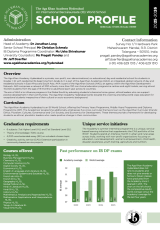Students create magazine as CAS Project
With its tumultuous socio-political climate and ravaging pandemic, the summer of 2020 brought to my mind endless questions on democracy, morality, agency, and freedom, and we were certain that we weren’t the only ones who were intrigued by these questions. In attempt to act on this pent-up curiosity, we birthed the idea of De-Construct – a place where students can publish their thoughts on these concepts. We gathered a team of people we knew could help us realize this goal: Jignesh, Nandini, Shanaya, and Shreyan. Through this magazine, the six of us hoped to take the first step in creating a space that is conducive to intellectual discourse among students. A magazine that does not just report, but tears down ambiguity, challenges power, and acknowledges bias. One that engages with that you already know, but pushes you to know more. If there’s one thing that I am certain of, it is that within our school community we have individuals who have thought provoking, eye-opening ideas to put forward – just not the right platform. De-Construct strives to be that platform.
The name “De-Construct” embodies our vision our vision of breaking down and simplifying broad phenomena and concepts. We emphasize on the word “constructs” to acknowledge that although most of what we speak about in the magazine exist solely in the shared human knowledge – from morals, to rights and laws – they are fundamental to our existence and merit our understanding and analysis.
The first issue, which we published on the 23rd of January, centres on the theme of “Expression, rights, and revolution.” As we mention in the opening note of the issue, these were concepts that played active roles in our world over the past year 2020 - a year of turmoil and change; yet, out of these circumstances, our magazine became an opportunity for civic engagement, and to examine power and the systems within which it exists. Although we kept no such theme in mind while initially choosing the topics for our issue, as we drew towards the end of the process, it was almost poetic how they all manifested these ideas. This only went to prove how relevant these three concepts are in our social and personal realities.
The process of writing, editing, and re-editing, and re-writing and finally designing and publishing De-Construct was by no means easy. It was a very lengthy process, as our methodology involved both primary and secondary research, where we facilitated debate-style talks with humanities teachers, took sessions with students to understand their perspectives, and held discussions within ourselves. With all of us being IB Diploma students, the academic workload was rarely kind to us, and working remotely did not ease the pressure. However, we cannot imagine doing it without the extremely hardworking, dedicated team members who patiently bore the hours of zoom calls, edits, and feedback sessions. Now that we’re done with our first issue, the joy, satisfaction, hope, and excitement that I feel is incomparable. I’m talking about jumping-up-and-down-screaming-on-a-zoom-call kind of excitement. There is much for us to improve on, but we know that we have created something to be proud of. We’ve grown attached to this magazine – there is something so personal about it for us. De-construct is a reflection of ourselves as writers, our passions and thoughts - things that we wished we knew more about, that were “normalized” as areas of conversation. Its mission represents something far greater – a shift towards us students taking control of our learning, of us proving that the critical thinking that our MYP teachers went on and on about was not wasted on us. It is an act of gratitude to our teachers, but also an act of resistance to society, as we refuse to accept “black and white”, conventional values and knowledge, and instead try to create our own.
While it is categorized as a “Creative” CAS project, we believe that there is an element of service attached to our magazine, as we proceed with a mission of informing, inspiring, and stimulating ideas, and of combatting the pervasive misinformation that breeds in the public mind. Following the response to this issue, we hope to make this magazine a permanent part of the school community, for inquisitive and passionate teenagers apart from us to continue to write, publish, inform, and suspend ignorance for years after us.
Click here to read the magazine.
Jacintha Thota and Soha Jiwani
DP1






